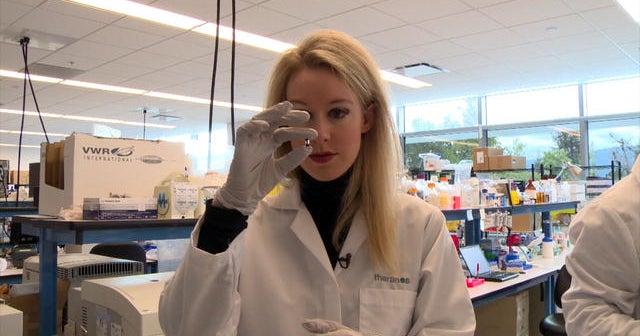Elizabeth Holmes and Fraudulent Futurism
For those of you that don't know, Elizabeth Holmes, CEO of Theranos, a biotech company specializing in blood testing technologies, was indicted of wire fraud recently. Her company claimed to be manufacturing small blood testing machines that could take just one drop of blood and run upto a thousand tests, but in reality, it could only run one test and that too not always accurately. What is shocking is that Theranos was valued at 9 billion USD, all for some technology that didn't even exist. In this episode in the Elizabeth Holmes series, I talk about how futuristic design played a part in making the scam possible.
It doesn't matter who we are. There is always going to be some part of the world, or some idea of how the world could or should be, that we will not relate to personally. For example, I have never lived in Central Asia, but I still know that Central Asia exists and some things about what it's like because there of information absorbed by my brain over an extended period of time. I have never seen a rocket with my own eyes, but TV has helped me have an image of it and therefore, I would be able to recognize it the first time I lay eyes on one. Come to think of it, most of what I know is composed of ideas and representations, not first hand experience.
These representations are responsible for how a good portion of the population romanticizes periods in the future, imagining kings and queens draped in finery and decked up in precious jewels while speaking in elegant accents, while the truth in previous centuries was more about widespread disease, random beheadings, wars and despotic rulers, with the average person having a life of hard labour and little to no power, and yes, this was true even in Western Europe which is supposed to be the pinnacle of development today. These representations are responsible for misconceptions we have about communities other than our own, and stereotypes which persist even when there is little interpersonal interaction between groups.
I think at this point you could understand how representations have affected our visions of the future as well.
Take for example the case of smartphones. A smartphone company is visualized by many as a glass-cladd office building with underground chambers lit with neon and scientists in lab coats diligently working in front of computers and fancy laboratory equipment. It is a honour to be working for a company making smartphones. However, in reality, the actual manufacture of smartphones happens in sweatshop-like settings, with underpaid, usually Asian, men and women slogging away performing repetitive tasks, the human beings basically just treated like machines. Now, this isn't to say that smartphones don't do any good, or the basic idea of smartphones is unethical, but it explains why people are able to successfully overlook what happens behind the scenes of a tech company and only focus on the positives. It is similar to the manufacturing of fireworks, which start to seem a lot less celebratory when you find out about the child labour that goes into making them.
I think part of what made Elizabeth Holmes' scam go on for so long is that she invested in an idea of changing the world that we have accepted in our minds as the path to the future. If you look at the promotional material of Theranos, their facilities appear to be futuristic places with the latest technological innovations, even when we don't really know what the technology does. That's because years of science fiction, movies, television and Silicon Valley powerhouses have taught us to associate certain images with progress and development, and for this, George Orwell and Issac Assimov are just as responsible as Steve Jobs, even though their intentions may have been different.
What Elizabeth Holmes did, essentially, was invest in creating a set, not at all dissimilar to how maybe a Hollywood production house would build a set for a sci-fi show. Her 'technology' was essentially just props, things that looked like they served a purpose but were beyond the fourth wall and therefore couldn't be checked for their effectiveness.
I think this is an opportunity to re-examine what all we have internalized in terms of imagery. Are we at a point where the looks of something have become this important that even billionaire investors could be fooled by techno-looking packaging? And if this true, are we on our way to regressing as a society, as no matter how much we want to embrace all people for how they look, will we continue to judge their position in life by how they are packaged, whether they wear a grey T-shirt and hoodie and therefore are the smart guys or whether they wear ratty denim cutoff shorts and tank tops and therefore are on the Duck Dynasty side of things? The design aspect of the Elizabeth Holmes scandal opens up an interesting discussion that needs to be addressed in case we want to really move forward in the world, and maybe if we look at the issue carefully, we can figure out how we can not get fooled as consumers and investors in the future
 |
| My reaction to Elizabeth Holmes is equal parts horror and admiration, because seriously, how the hell did she pull this off? |
These representations are responsible for how a good portion of the population romanticizes periods in the future, imagining kings and queens draped in finery and decked up in precious jewels while speaking in elegant accents, while the truth in previous centuries was more about widespread disease, random beheadings, wars and despotic rulers, with the average person having a life of hard labour and little to no power, and yes, this was true even in Western Europe which is supposed to be the pinnacle of development today. These representations are responsible for misconceptions we have about communities other than our own, and stereotypes which persist even when there is little interpersonal interaction between groups.
I think at this point you could understand how representations have affected our visions of the future as well.
Take for example the case of smartphones. A smartphone company is visualized by many as a glass-cladd office building with underground chambers lit with neon and scientists in lab coats diligently working in front of computers and fancy laboratory equipment. It is a honour to be working for a company making smartphones. However, in reality, the actual manufacture of smartphones happens in sweatshop-like settings, with underpaid, usually Asian, men and women slogging away performing repetitive tasks, the human beings basically just treated like machines. Now, this isn't to say that smartphones don't do any good, or the basic idea of smartphones is unethical, but it explains why people are able to successfully overlook what happens behind the scenes of a tech company and only focus on the positives. It is similar to the manufacturing of fireworks, which start to seem a lot less celebratory when you find out about the child labour that goes into making them.
 |
| Oh, really, Theranos? Really? |
I think part of what made Elizabeth Holmes' scam go on for so long is that she invested in an idea of changing the world that we have accepted in our minds as the path to the future. If you look at the promotional material of Theranos, their facilities appear to be futuristic places with the latest technological innovations, even when we don't really know what the technology does. That's because years of science fiction, movies, television and Silicon Valley powerhouses have taught us to associate certain images with progress and development, and for this, George Orwell and Issac Assimov are just as responsible as Steve Jobs, even though their intentions may have been different.
 |
| Could you believe she's just playing with toys here? There was never any technology in the first place. |
What Elizabeth Holmes did, essentially, was invest in creating a set, not at all dissimilar to how maybe a Hollywood production house would build a set for a sci-fi show. Her 'technology' was essentially just props, things that looked like they served a purpose but were beyond the fourth wall and therefore couldn't be checked for their effectiveness.
I think this is an opportunity to re-examine what all we have internalized in terms of imagery. Are we at a point where the looks of something have become this important that even billionaire investors could be fooled by techno-looking packaging? And if this true, are we on our way to regressing as a society, as no matter how much we want to embrace all people for how they look, will we continue to judge their position in life by how they are packaged, whether they wear a grey T-shirt and hoodie and therefore are the smart guys or whether they wear ratty denim cutoff shorts and tank tops and therefore are on the Duck Dynasty side of things? The design aspect of the Elizabeth Holmes scandal opens up an interesting discussion that needs to be addressed in case we want to really move forward in the world, and maybe if we look at the issue carefully, we can figure out how we can not get fooled as consumers and investors in the future

Comments
Post a Comment